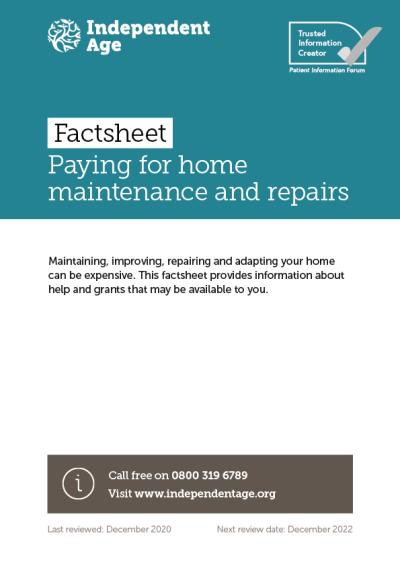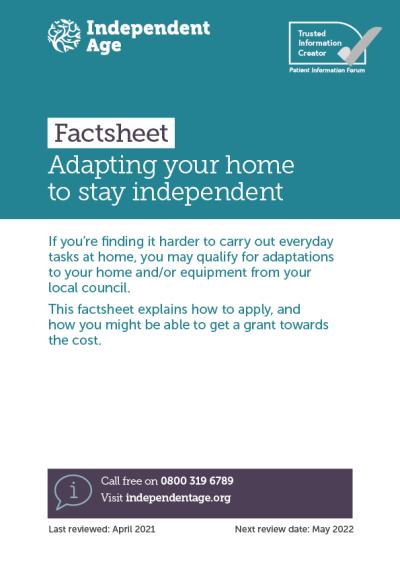Related publications

Paying for home maintenance and repairs

Looking after your home can be expensive. But it’s really important for your safety and wellbeing to stay on top of things. It’s also a good idea to try to plan ahead so you can continue to live independently. You can get practical help to maintain your home and you might also be able to get help with costs.
Staying on top of things and getting repairs done early can save you money later on. It will also maximise the value of your property in case you need to sell later.
Some of the areas you should check regularly include:
To find a reputable trader, visit Trustmark or Buy With Confidence. You can find a registered gas engineer on the Gas Safe Register. For more advice about electrics, go to Electrical Safety First.
It’s also good to think about any changes you might want to make to help you stay independent in the future. For example:
If you’re a homeowner or a landlord and need help with costs on certain home improvements, you could apply for a Green Homes Grant. This scheme gives you a voucher towards the cost of installing energy-efficient home improvements, such as double glazing, wall insulation and heating controls.
If you receive Guarantee Pension Credit or you’re on a low income or receive certain other benefits, you may qualify for a discount on your electricity bill under the Warm Home Discount Scheme. Your energy supplier will have to be part of the scheme. If you qualify, a one-off payment of £140 will be credited to your electricity account, key or meter by the end of March each year.
If you’re having problems managing your energy bills, some energy companies have grants or trusts that can help. You don’t always have to be with that energy company to apply, but contact your own supplier first to find out if they have grants available. Simple Energy Advice can direct you to organisations that can help with energy debts. They can also give personalised advice on how to cut your energy bills through their energy efficiency calculator.
Handyperson services carry out small tasks and repairs, such as:
If you’re finding it difficult to do small jobs around the home, your local council may have a list of approved handyperson services that can help you. Contact the council’s housing department. Your local Age UK or another local charity may offer a handyperson service, but make sure the provider is approved, for example by Trustmark, Buy With Confidence or your local council.
A Home Improvement Agency (HIA) is a not-for-profit organisation that can provide help and advice on home maintenance and repairs, including:
Not all HIAs provide all these services. You will need to contact your local HIA:
Most HIAs offer free initial advice, but will probably charge a fee if you decide to go ahead with work with their assistance.
Before you employ a builder:
When choosing a builder:
Beware of builders who knock on your door and advise you that you need to have some work done. Always check the credentials of any contractors and don’t employ anyone who puts you under pressure to make a quick decision. Our Scams hub has more advice on how to spot a scam.
If you own your home, you'll need buildings and contents insurance for your home. If you’re a leaseholder, your freeholder will probably arrange and manage the buildings insurance policy. If you rent, your landlord is responsible for the buildings insurance, but you should consider taking out contents cover.
Compare a number of quotes. You could try a free price comparison site such as Uswitch. If you’re buying buildings and contents insurance, it’s often cheaper to get a joint policy. Our webpage Shopping around for insurance has tips for choosing a policy. The Money Advice Service has information about what good policies should cover.
You should tell your insurance provider if you have work done on your home. This applies to tenants as well as home owners, especially if there is anything that may affect the security of your home, such as scaffolding. The cost of your policy may also be affected if the building work increases the value of your property.
If you‘re on a low income or receiving certain benefits, you may be eligible for financial help from your local council or the Social Fund, to help with repairs and improvements. This is usually in the form of an interest-free loan. For more information, see our factsheet Extra help with essential costs if you’re on a low income.
Some charities may also be able to provide financial help. For example, Macmillan Cancer Support can provide grants to help with extra costs that living with cancer can bring, such as energy bills and home adaptations. You can search for a charity at Turn2us.
You could consider taking out a personal loan from your bank or building society to help with home improvements or repairs. The interest rate and repayments are usually fixed, making it easier to budget. But you should always get professional financial advice before making a decision. The Money Advice Service has an online calculator to help you see how much a loan will cost and how quickly you can pay it off.
If you’ve taken out a loan to pay for repairs or home improvements and you’re receiving Guarantee Pension Credit or certain other benefits, you may be able to get help with the interest payments. Gov.uk has more information.

If you need to make repairs to your home, you may want to consider home adaptations that can help you continue to live independently and safely.
Our factsheet Paying for home maintenance and repairs has information about help and grants you could get.
If you’re thinking of taking out a loan to pay for home repairs and need advice, you can find a financial adviser through the Society of Later Life Advisers or Unbiased.
By calling Independent Age's free and impartial Helpline, you can get information and advice from one of our friendly advisers, or order our free guides.